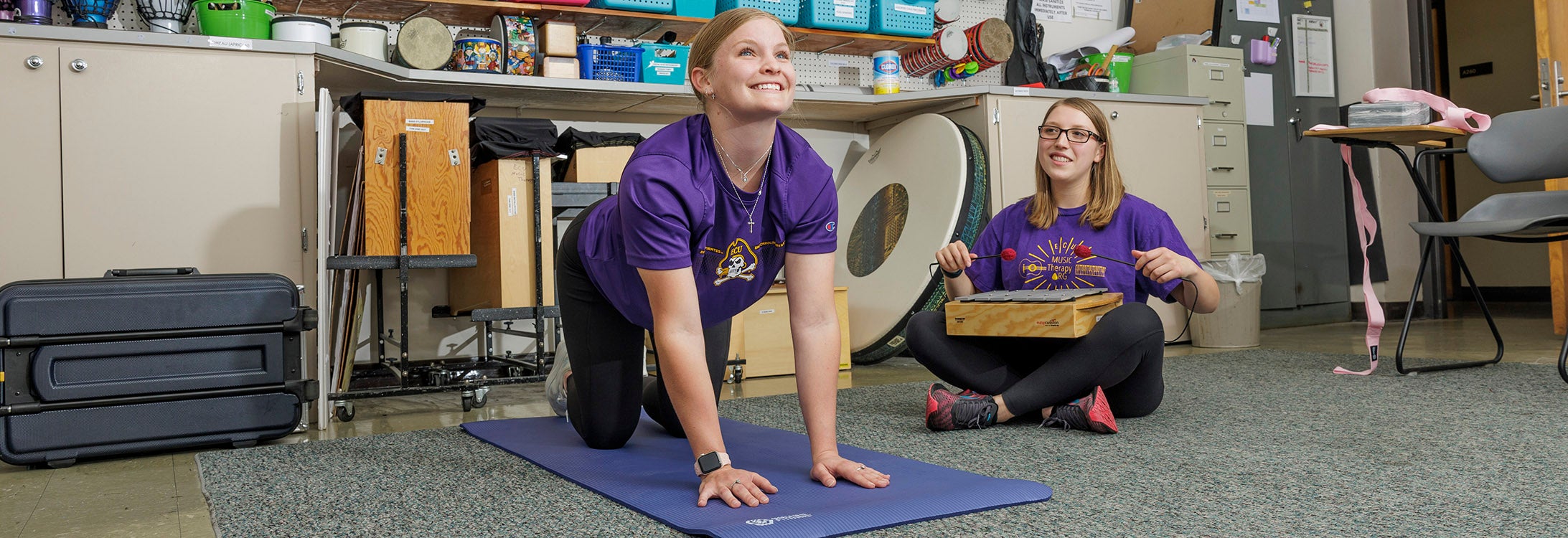Students pair music therapy, yoga in family caregiver research study
Sharing their research?
In March, East Carolina University music therapy students had the chance to engage with others in their field as they presented their research at the Southeastern Region conference for the American Music Therapy Association.
Music therapy faculty members Dr. Adrienne Steiner-Brett and Virginia Driscoll presented “Harmonizing through Research: Exploring undergraduate research experiences in music therapy” with senior Savannah Barclay, senior Aditi Bauer, junior and research interventionist, Abby Ortiz, and Maggie Ford ’24. Kensey Tarkington, a kinesiology senior who provides the yoga intervention with Ortiz in the study, submitted her piece to the presentation by video.
Ortiz said the presentation went well.
“There were a lot of music therapists, and they thought the collaboration was really interesting,” she said. “People were very excited.”
Tarkington focused her video comments on that interdisciplinary work.
“We are getting amplified results,” she said, adding that they wouldn’t see “nearly the same impact” without that collaboration.
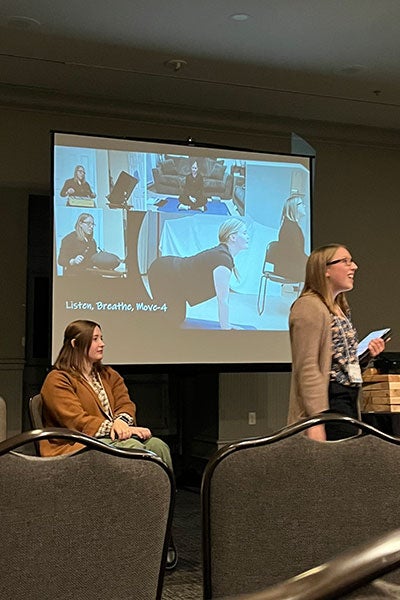
Music therapy junior Abby Ortiz presents her work for the ECU Listen, Breathe, Move research happening in collaboration with kinesiology, at the regional American Music Therapy Association conference in March.
Abby Ortiz and Kensey Tarkington might never have met without East Carolina University’s joint research project in music therapy and kinesiology.
Now the two laugh together as Tarkington demonstrates yoga moves with a strap, and Ortiz plays gentle music on a guitar or metallophone.
Ortiz, the music therapy junior, and Tarkington, the exercise physiology senior, have grown their appreciation for each other and their areas of study while growing the integrated music therapy and mindful yoga program to improve the well-being of informal family caregivers in the region. They also have become each other’s biggest fan.
“Abby can play any instrument in the room,” Tarkington said. “I had no idea music therapy students played so many instruments. I look forward to our sessions because Abby is going to play good music and I get to lay in shavasana and enjoy it with all the participants.
“I’ve found a greater appreciation for something I knew absolutely nothing about until this year.”
The Listen, Breathe, Move study involves Ortiz and Tarkington leading music therapy, meditation and yoga during a four-week virtual program for eligible caregivers. The students are trained and overseen by Dr. Adrienne Steiner-Brett of the School of Music and Dr. Bhibha Das of the Department of Kinesiology.
Ortiz begins with music-assisted guided breathing. Attention then shifts to Tarkington for gentle yoga instruction while Ortiz demonstrates modified moves in a chair. Sessions continue with a soothing and purposeful mix of music, meditation and yoga, all guided by the students.
“I had some experience with yoga, but I’ve learned so much more about yoga getting to do the modified poses,” Ortiz said. “It’s really cool. Music therapy by itself can be impactful, but when we put this together, it becomes so much more impactful.”
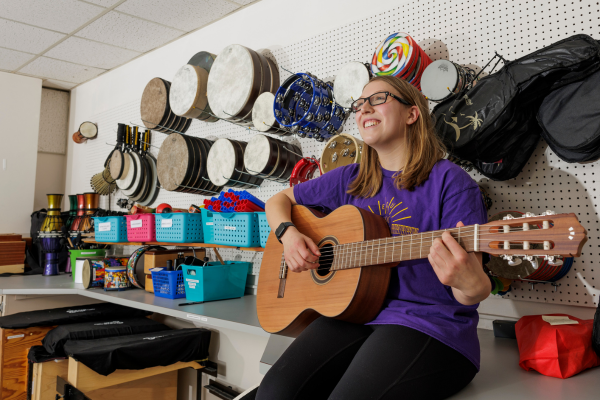
ECU music therapy junior Abby Ortiz plays guitar, one of the instruments she uses during an intervention session with family caregivers, at Fletcher Music Center.
They have held two of these sessions so far and are conducting post-session focus groups to round out their data.
They are actively recruiting for two additional virtual sessions for caregivers, to begin May 13 and 15. These sessions are specifically for informal family caregivers in eastern North Carolina, and those interested should contact the group at listenbreathemove@gmail.com or 252-328-4277.
Das and Steiner-Brett initiated a one-time pilot project for caregivers in the summer of 2023. The program has since expanded, incorporating Dr. Abby Schwartz with the School of Social Work and Office of Healthy Aging to help recruit participants.
Steiner-Brett and Das received a $10,000 2024-25 Research and Creative Activity Award from the College of Fine Arts and Communication for the Listen, Breathe, Move study. Also working with music therapy colleague Virginia Driscoll, Steiner-Brett aimed to use the funding primarily for their undergraduate student research assistants — including Ortiz and Tarkington — something unusual in their field, where graduate and doctoral students most often participate directly in research.
“Music therapy is very much a health care profession,” said Steiner-Brett, whose line of research is informal family caregiving. “Exercise science and music therapy, those areas don’t usually work together, and especially at the undergraduate level; CFAC being willing to let the budget be for undergraduate work was monumental. This is a big collaboration.”
Das and Steiner-Brett agree that participating in the research gives their undergraduates a significant advantage.
“It’s not a normal type of experience,” Steiner-Brett said. “They’re getting to have an authentic research experience sooner.”
There also are immense benefits for the participating caregivers, and their feedback has made a lasting impression on Ortiz and Tarkington.
“We give out yoga blocks and the yoga strap and we had a participant who told us it came to her in the mail, and she was reading over the instructions and so excited,” Tarkington said. “She was just so thrilled, because she had never done yoga before or held a yoga strap.
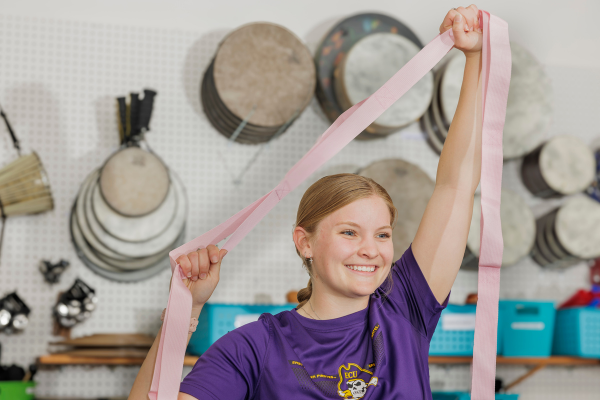
ECU exercise physiology senior Kensey Tarkington demonstrates mountain pose with a yoga strap, one of the poses she shares during intervention sessions with family caregivers.
“I think the biggest joy from it is always going to be the people. It’s the people we work with and build friendships with, and then the participants are at the center of it all. To see the work you do actually make an impact on people’s lives and their well-being is the coolest thing.”
Added Ortiz: “I’ve really enjoyed learning about all these music-assisted guided breathings. We’ve learned about it in class, but then building the connections with our team and meeting all the participants and hearing their stories and seeing how we can help them; it’s been so rewarding.”
Das mentioned nutrition and public health as natural partners for kinesiology researchers. Collaborating with music therapy experts has inspired Das, and there is a personal connection to the project for her and Steiner-Brett.
“When we work with someone outside of our discipline to learn from them and their students and faculty, it’s really rewarding I think for all of us,” Das said. “It’s a great experience because the science is a more robust intervention and we’re reaching communities through student success and regional transformation.
“This project also is truly a labor of love for both Adrienne and I, stemming from our own caregiving experiences for our respective parents. This is something that is truly personal for both of us, and to be able to use our lived experiences to improve the well-being of other caregivers means so much to us.”
While they are still mid-study, Steiner-Brett said the data is trending positively, with “good adherence” to the program, which the group hopes caregivers can integrate into their lives after the virtual sessions. She said participants also are reporting a more positive outlook on physical activity, and that the relaxation segments are more effective with the music.
Looking ahead, the group hopes to add new data measurements, like considering the guilt caregivers might feel at taking time to care for themselves. Ortiz and Tarkington also are recording videos of the meditation, music and yoga sequence, with plans to offer asynchronous sessions this fall.
“I think this intervention has a lot of potential,” Steiner-Brett said. “It’s twofold: experience it in the moment, then have the tools and feel empowered to use some components of that to build your own toolbox.”
It has a lot of potential for Ortiz and Tarkington, too, as they look toward their career paths. Steiner-Brett said one of the most meaningful parts of the project is the respect the students have for the other discipline, and the students agree.
“We always talk about collaboration with occupational therapy, speech therapy,” Ortiz said. “Being able to do it before we get into the field, it’s been really great.”
Tarkington summarized the project with a simple message.
“This works,” she said. “It’s so unique, but it works together. We know physical activity, yoga, meditation, is good for mental well-being. We know music, separately, is good for well-being. The thought of putting that together, you see robust changes in people when you add our two components together.”
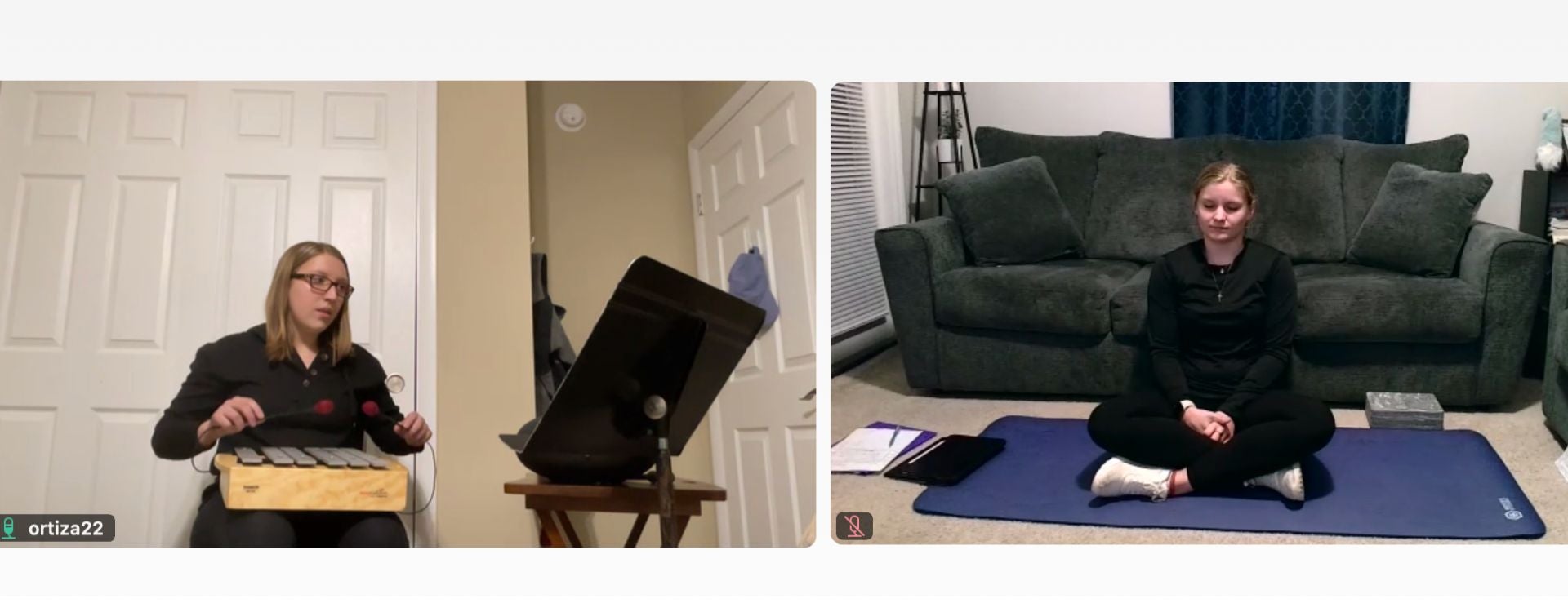
ECU undergraduate Abby Ortiz, left, plays a metallophone and recites a meditation while undergraduate Kensey Tarkington, right, relaxes in a yoga pose, in a screenshot from one of the virtual sessions the two provide for informal caregivers.
